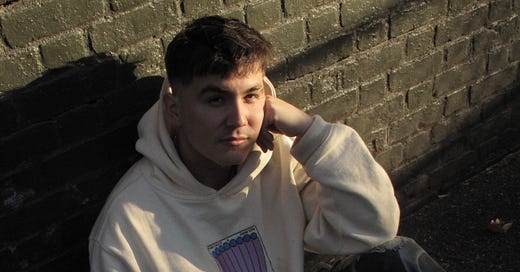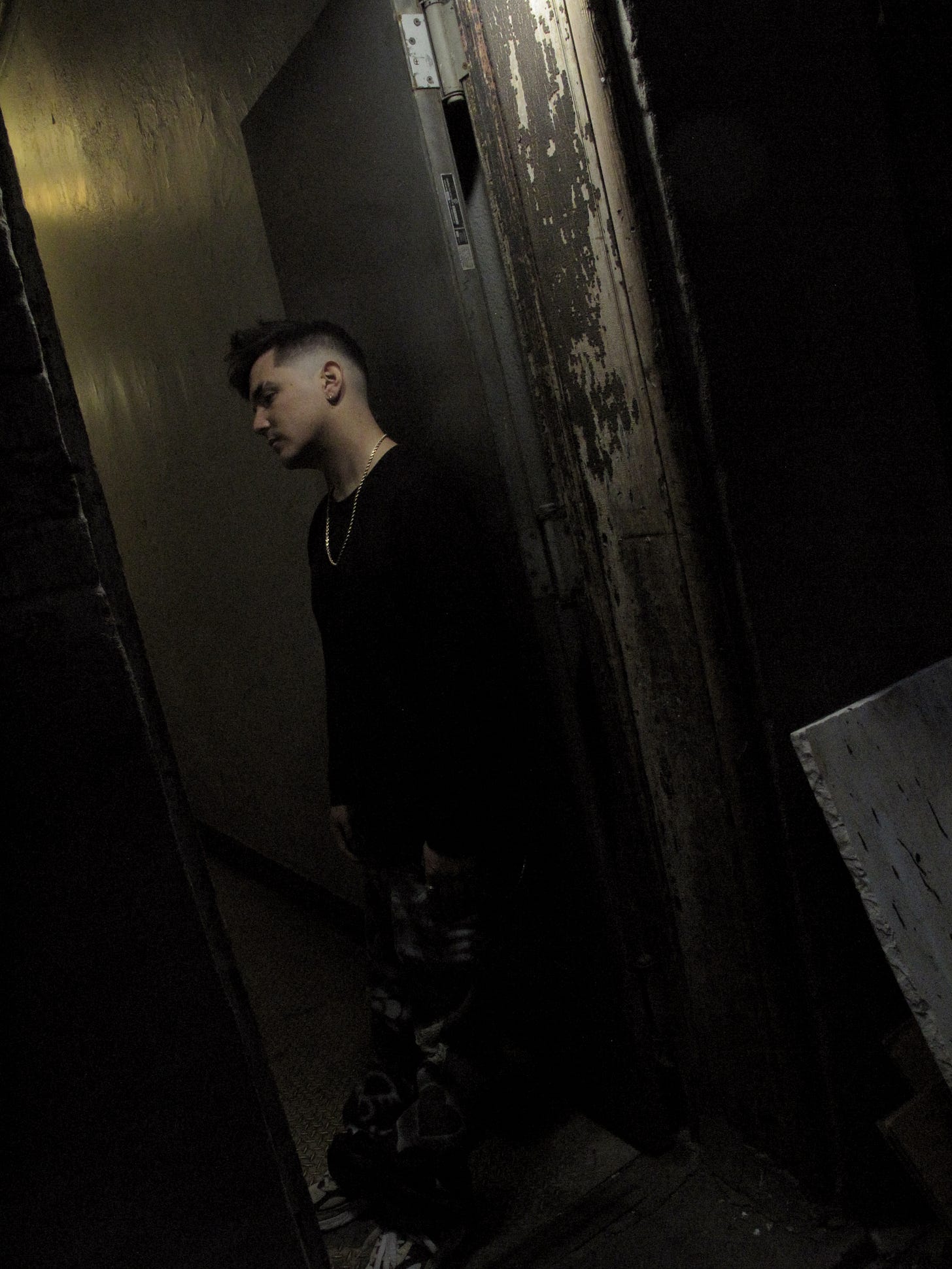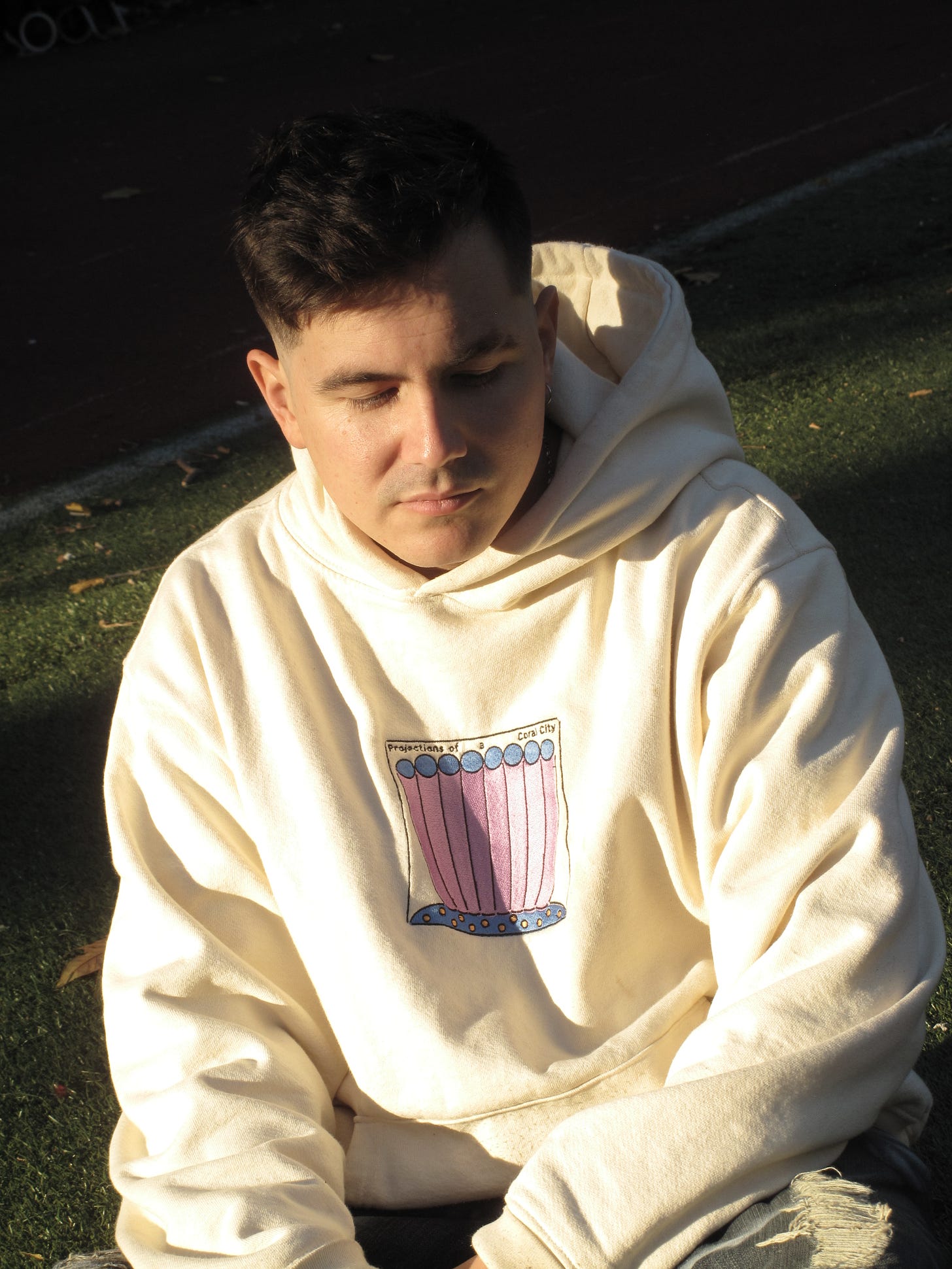FR123: Nick León Is Putting the “Weird, Magic-Hour” Miami Back in Electronic Music
The Miami producer talks Florida psychedelia, Latin club, and staying true to himself
Nick León thought he’d reached the breaking point last year. He’d been gigging in Europe seemingly forever, just the latest stretch in a nonstop run on the road that began in 2022, when, between the one-two punch of a production credit for Rosalía and the unexpected success of his single “Xtasis,” the Miami producer’s career went stratospheric.
Since then, he’d been trying to juggle his varied interests and opportunities—freelance production work in pop and hip-hop; deep roots in Miami dance music; a passion for club styles from across the Americas; a newfound profile on the European electronic scene—just as the sounds of so-called Latin club were taking off around the world. “Xtasis,” backed by a remix from a coproduction with the Venezuelan raptor-house legend DJ Babatr, had helped make León one of the accidental stars of the scene—never mind that the California native, as an American-born Latino, was never exactly comfortable being saddled with that profile. He should have been flying high. Instead, he felt like his DJing was getting worse. He was leaning further and further into the four-on-the-floor sounds that he thought his audiences wanted to hear; when he dropped dembow into the mix, it felt forced, tokenistic. He was miserable.
Then he flew south, to Brazil and Ecuador, and witnessing the local DJs there hit him like a revelation: “I was like, oh, I don’t hate dance music,” León told me earlier this month over a Zoom call from Barcelona, laughing. “I’ve just been in Europe for too long.”
The difficulty of staying true to yourself is an age-old tale in music—particularly for artists from the margins who suddenly find themselves under the spotlight, prized as purveyors of a sound the mainstream has deemed exotic and thus desirable. León’s new album, A Tropical Entropy, represents his own attempt at a recalibration of his career—to move away from club bangers and into more introspective, varied territory; and, crucially, to remind listeners that he is, first and foremost, a Miami artist.
Inspired in part by Joan Didion’s 1987 book Miami, A Tropical Entropy is grounded in the culture and contradictions of South Florida, a psychedelic, “weird, magic-hour, colorful space that doesn’t quite feel like it’s a real place, but also is very much a real place with struggles and darkness.” It features fellow Floridians like Jonny From Space as well as friends from around the world like Colombia’s Ela Minus and Copenhagen’s Erika de Casier; just as importantly, the label behind it is TraTraTrax, the Colombian label run by DJ Lomalinda, Nyksan, and Verraco that helped boost León’s profile by putting out “Xtasis.”
As it turns out, León didn’t even want to put out “Xtasis”—it took Verraco’s urging for that track to see the light of day. That was just one revelation in our nearly 90-minute call, which touched on his ambivalence over the “Latin club” phenomenon; his desire to get back to his Miami roots; how “Bikini,” his 2024 summer anthem with Erika de Casier, came to light; why he calls A Tropical Entropy his “fake pop album”; and how the demands of life on the road led to a near-breakdown—and informed the concept of home that grounds the new LP.
(Full disclosure: I’m obviously biased in my fandom, as my label, Balmat, put out León and Coral Morphologic’s wonderful 2024 album Projections of a Coral City, a kind of speculative sonic fiction imagining a future Miami flooded by global warming.)
Scroll on for the full interview. The first third is free to read for all, while the rest has been reserved for paying subscribers, in gratitude for their support.
Your support makes this newsletter possible! Paid subscriptions are $5 a month or $50 a year; perks include exclusive playlists for chilling and clubbing (now available on Deezer as well as Apple Music and Spotify); the ongoing Mixes Digest series; and full access to the archives, including interviews with FaltyDL, Anthony Naples, Penelope Trappes, Seefeel’s Mark Clifford, and more.
Hi Nick, where are you?
I’m in Barcelona right now. Do you know Phran? I’m staying at Phran’s place. I’ve been here since last Wednesday. I was here for Primavera, and this year they were doing a writing camp with some of the artists. They put us in the studio together, so I came a little early to do some sessions.
Tell me more about that.
It was UMPG Spain and Primavera. There’s this artist Amore, I’m a big fan of her stuff, she’s from Madrid. We were supposed to do some stuff together, but I came a day late. It was with her, Namasenda from Stockholm, this producer nusar3000, also from Madrid. It was cool to just feel it out, get into the music. It was John Talabot’s studio. It’s called Angel Sound Studios, he has his room there—I saw him on the way out. It was cute to do the little musician gathering before the festivities.
Were you collaborating on any specific projects?
I think mostly it was just putting us in the room together. I like working that way. It’s hard for me to make beats for people without them being in the room with me, unless it’s somebody with a super clear aesthetic that I can fit into. But I like just starting from scratch.
Did you play Primavera as well, or were you just there to hang?
Yeah, I played on Saturday. I had originally come for this camp, and then because I was already here and they ended up having this open two hours, I got booked last minute with a bunch of the Latin American homies. RHR was on that stage, Nicolá Cruz. INVT were there as well, from Miami, so it was just like the homie stage. And everybody did amazing. I didn’t really go to any other stage that night.
What stage was it?
Nitsa, the DJ stage. I hadn’t been there before. I was at Primavera last year, but I really didn’t get to explore the festival. This time, it was a big green stage, on the side of where I think the main one is. DJ Python played a couple of days before. [Taking hoodie off, revealing a graphic T-shirt beneath]
Graphic tee under a graphic sweatshirt.
Yeah, exactly.
What’s the T-shirt say?
[Pans camera down to reveal T-shirt: “WHY DO PEOPLE DIE”]
Oh, shit!
Yeah. This one gets mixed responses sometimes. [giggles]
What’s it from?
It’s this artist, Nik Kosmas. I wasn’t really in that world when it was a thing, but there was this art group called AIDS-3D from the net-art era, 2013, ’14. I had been following some of his stuff. He has these pretty ridiculous graphic tees and this was one of ’em. They’re all very intense, but also kind of cheeky. I was in a mood when I got it.
You could really fuck up somebody’s night wearing that.
Yeah, yeah, especially if they’re on psychedelics or something. I thought it was maybe too intense for the interview, so I put something over it.
It’s all good, I’m feeling grounded today.
This other one is on a similar vibe too. [Holds up the hoodie]
“The world burned and you chose to do nothing.”
You know, love that existential fashion.
Who’s the sweatshirt by?
This is by my friends in New York, their brand is called Do Nothing. There’s a studio that I’m always in when I’m over there that’s run by my friend Sammy, and it’s in the same building. They do their embroidery and everything. They actually made a hoodie of the Balmat cover.
I saw that on your Instagram!
Yeah, so they loved it so much they just did the embroidery. I’m a fan of what they do, and it came out wonderful. I was rocking it so much. And the color too, that yellow-ish cream, it’s really nice and refreshing, in a world of blacks and grays.
It’s good to have a little color every now and then. So obviously I want to talk about the record in depth, but maybe to lead up to it, could you sketch out your last couple of years for me? Because I get the feeling that it’s been intense, and I was wondering if, looking back, you could locate an inflection point where things took off for you?
It was probably between—I’m not a hundred percent sure on the year, which goes to show where I’m coming from. I think “Xtasis” came out in 2022.
Right.
OK. So then it was basically between the time of that coming out—I had just signed with an agency for the first time for Europe, and I was going to do my first Euro tour in the fall of that year. That was also the same year that I had been connected with Rosalía. So it was like these two different paths happening at the same time. Being in this huge pop artist’s circle all of a sudden and playing around in that world, feeling a bit like I didn’t belong there but still trying to manage; and then having recognition in this underground dance music world and traveling consistently for the first time. I went in two different directions a little bit, which was difficult to navigate, but at the same time, one took over naturally. Once I got on the road really is when it all just became a bit of a blur. My concept of time has drastically changed. My priorities, wondering what I’m even doing this for. I don’t know, I’m very much the type of person that dives into something to know what it’s like. And once I started, I wanted to ride it as far as it goes and see what the limits are. And I learned after about a year and a half what the limits are.
In what way?
Mentally, physically as well. I was traveling pretty much nonstop. I know it’s common for the working DJ these days, but it’s pretty brutal. It’s pretty brutal on your body, but also for me it was this disengagement with reality. It almost felt dreamlike. You wake up and you’re like, wait, I’m in Slovenia, and then you’re back. In the beginning I was still living in Miami, so I would go back to Miami and at that time Miami was also changing drastically, with gentrification and tech people moving in. I’d come back every couple of months and it would be very different, so I wouldn’t really have that grounding experience of being at home. It was just like, whoa, this is changing.
That’s interesting.
That broke my brain in a lot of ways. But at the same time, this is my job and I want to push through and make a living. So you’re wrestling with those two sides of it. I got a little off topic there, but between “Xtasis,” Rosalía, 2022—stuff had been brewing before that, and I’d definitely been around in different circles doing different kinds of music before that. But I think the consistency of being in this continuum of nonstop sessions or DJing odd hours—somebody said something to me a couple months ago, or last year, like, it takes the body 17 days to reset your internal clock, or something like that. And I was just like, oh, well, good to know that it hasn’t been reset in two years. I don’t know if I’ve been in one place for more than 17 days in that period. That definitely informed this project, 100 percent. I think this is the only project I could have made after experiencing that. It feels a bit cliche, but I understand what being on the road does to you, and losing relationships, and how it affects your friendships with people. It makes things very confusing in a lot of ways, if you don’t have good grounding mechanisms. That’s been a learning process for me, for sure.
Was there a breaking point along the way, or have you gradually learned to manage it in a way that makes sense for you?
There definitely was around the end of 2023. Basically, I had just come back to Miami after this really intense three-month period in Europe, doing festivals and whatever. I came back to Miami for a day and immediately flew to New York the next day to play a show, and I left a dumpster fire behind me with an ex-girlfriend and other stuff going on. Very much not taking care of myself, getting pretty wasted and that kind of thing. Just fully burnt out at that moment. I had four shows left in the States. I was supposed to go to New Orleans and do this other thing, and it was the first time that I canceled something. I actually asked a friend if it’s OK to do that. I was like, if I call my agent and I’m like, Hey, I don’t feel like I can do this, is that OK?
Keep reading with a 7-day free trial
Subscribe to Futurism Restated to keep reading this post and get 7 days of free access to the full post archives.









